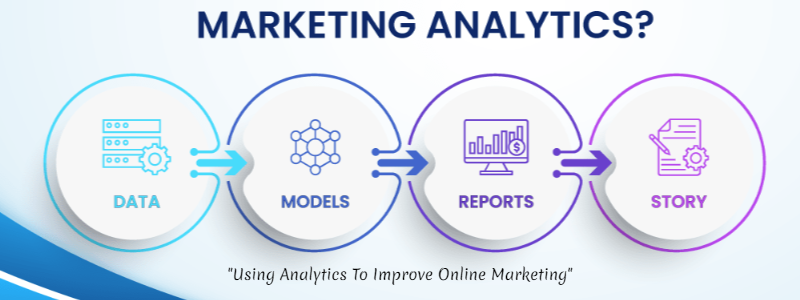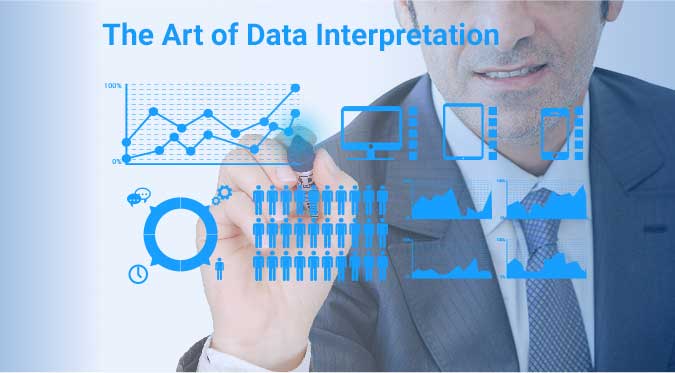“Using Analytics To Improve Online Marketing” has become a mantra for businesses navigating the ever-evolving digital landscape.
In today’s fast-paced world, where every click, view, and engagement can be tracked and analyzed, harnessing the power of analytics has become paramount for businesses aiming to thrive in the competitive online marketplace.
From identifying consumer preferences to optimizing marketing strategies, the utilization of analytics has revolutionized the way businesses approach online marketing.
With data-driven insights at their fingertips, companies can not only understand their target audience better but also refine their digital campaigns to achieve maximum impact and ROI.
I’m going to kick things off by addressing the pivotal role analytics plays in sculpting your online marketing efforts.
Pivotal Role Analytics Plays
The connection between data analysis and successful marketing is becoming increasingly inseparable, and I’m here to help you understand why that is.
Analytics in the realm of digital marketing isn’t new, but the ways we can harness this tool have taken on new dimensions.
With the vast landscape of online interaction, gathering data has become a rich resource for those willing to listen to the numbers.
This isn’t just about collecting figures; it’s also about developing a mindset that values evidence over assumption.
We’re setting up a foundation here that highlights why crunching numbers is essential to meet your online objectives.
And with that foundation, we’ll smoothly transition into the next section: identifying the exact types of data that can fuel your growth.
Choosing the right metrics isn’t a one-size-fits-all situation; it’s a bespoke suit that fits the unique contours of your business goals.

Capturing the Right Data: Key Metrics that Matter
In my opinion, if you want to refine your online marketing, you’ve got to start with solid data. That means identifying key performance indicators (KPIs) that tell you how you’re doing.
Choose something that resonates with you and your business goals; whether that’s website traffic, conversion rates, or customer lifetime value, make sure these metrics provide real insight into your performance.
Understanding customer behavior isn’t just useful, it’s critical. By analyzing data on how users interact with your website, you can uncover patterns that inform your marketing decisions.
And don’t worry too much about volume at the start. The goal is to get quality data that answers your most pressing questions, like which pages are engaged with the most or where your traffic is coming from.
Now, here’s where things get interesting. Real-time data can be a goldmine, as it allows you to make informed decisions quickly.
For instance, if you’re running an ad campaign, having real-time insights will let you optimize on the fly, potentially saving you funds and improving performance at the same time.
It’s like having a finger on the pulse of your marketing efforts – you can always adjust your approach down the road as you learn what works and what doesn’t.
A lot is happening very quickly in the online world, and staying up-to-date with trends is paramount.
So, incorporating a dynamic approach to data capture, with evolving metrics and real-time analysis, prepares you to not just understand, but also effectively respond to the fast-paced digital marketplace.
Interpreting Data Insights: From Numbers to Strategy
I’m going to guide you through transforming raw data into a strategic asset for your online marketing campaigns.
This isn’t just about number crunching; it’s also about telling a story with the data that points your efforts in the right direction.
To begin, you’ll learn techniques that help turn complex data sets into comprehensible insights.
Think of this as translating a foreign language into your native tongue.
You’re going to find out about data visualization tools that can depict trends, compare performance metrics, and highlight areas needing attention in an instantly understandable way.
In my opinion, simply having data isn’t enough. The real magic happens when you know how to interpret this information correctly.
We’ll dive into identifying patterns that your business can capitalize on and isolating anomalies that may need troubleshooting.
Don’t worry too much about occasional outliers, but rather focus on consistent trends that impact your decision-making.
A common pitfall? Not seeing the forest for the trees. Sometimes we get so bogged down in the details that we miss the overall narrative the data is telling us.

We’ll talk about balancing what the numbers indicate with the context of your market and industry, ensuring you’re not misled by superficial readings.
I’ll share a couple of case studies that show how others have effectively turned their data insights into marketing success stories.
You’ll see the transformative power of well-interpreted analytics in driving targeted campaigns, enhancing customer experience, and developing new products.
Optimizing Marketing Campaigns with Predictive Analytics
Now what is predictive analytics? It’s a branch of analytics that uses historical data, statistical algorithms, and machine-learning techniques to forecast future outcomes.
In the realm of online marketing, it’s a game-changer. By anticipating future behaviors and trends, marketers can create highly targeted campaigns that resonate with their audience.
Think of predictive analytics as having a crystal ball, but one backed by data. You can use it for nuanced audience segmentation, pinpointing precisely who to target based on likely future actions.
For instance, by examining past purchase history and online behavior, you can predict who might be interested in a new product and tailor your marketing messages accordingly.
But it’s not just about targeting; it’s also about timing. Predictive models can help determine the best times to engage with your audience, optimizing for when they’re most receptive.
This fine-tuning ensures a higher probability of conversion and maximizes ROI by reducing wasted ad spend on unresponsive audiences.
Predictive analytics shines when you’re trying to stay ahead of trends. By analyzing search patterns, social media interactions, and even external factors like seasonal changes, marketers can adjust their strategies in real time.
This proactive approach keeps campaigns fresh and aligned with consumer desires before they become mainstream demands.
As you step into the practice of predictive analytics, remember that the quality of predictions relies on the quality of data.
Hence, your first step is to ensure your datasets are robust and clean. Only then can predictive models be accurately constructed and be valuable inputs to your campaign strategy.
Utilizing analytics to enhance online marketing Pros & Cons
Utilizing analytics to enhance online marketing offers numerous benefits, but it also presents certain drawbacks. Let’s delve into the pros and cons:
Pros:
- Data-Driven Decision Making: Analytics provide invaluable insights into consumer behavior, preferences, and trends, empowering marketers to make informed decisions based on concrete data rather than intuition.
- Targeted Marketing: By analyzing consumer data, marketers can segment their audience more effectively and tailor marketing messages to specific demographics or interests, increasing the relevance and effectiveness of their campaigns.
- Optimization of Campaigns: Analytics enable continuous monitoring and optimization of marketing campaigns in real time. Marketers can identify which strategies are working and which are not, allowing them to adjust their approach promptly for better results.
- Improved ROI: With analytics, marketers can track the performance of their campaigns and attribute conversions to specific marketing efforts. This helps in allocating resources more efficiently, maximizing return on investment (ROI).
Cons:
- Data Overload: The abundance of data provided by analytics tools can sometimes be overwhelming, making it challenging for marketers to extract meaningful insights and prioritize actions effectively.
- Privacy Concerns: Collecting and analyzing consumer data raises privacy concerns among users. Marketers must navigate the ethical and legal implications of data collection and ensure compliance with regulations such as GDPR and CCPA.
- Cost and Complexity: Implementing analytics tools and systems requires investment in technology, training, and expertise. Small businesses with limited resources may find it challenging to afford or manage sophisticated analytics solutions.
- Overreliance on Data: Relying solely on analytics for decision-making can lead to a lack of creativity and innovation in marketing strategies. Marketers need to balance data-driven insights with human intuition and creativity to create compelling campaigns.
While leveraging analytics in online marketing offers significant advantages in terms of precision, efficiency, and effectiveness, marketers must be mindful of the potential drawbacks and approach data-driven decision-making with caution and balance.
My Experience with Using Analytics To Improve Online Marketing
As a small business owner navigating the digital realm, I was constantly searching for ways to boost my online presence and drive more traffic to my e-commerce store.

Despite my best efforts, I found myself hitting a plateau in terms of website visits and sales.
That’s when I decided to delve deeper into the world of analytics. Implementing tools like Google Analytics and Facebook Insights opened up a whole new world of possibilities for me.
Suddenly, I had access to a treasure trove of data about my website visitors and social media audience.
Analyzing this data proved to be a game-changer for my marketing strategy. I discovered that a significant portion of my website traffic was coming from a specific demographic group that I hadn’t previously targeted.
Armed with this insight, I adjusted my advertising campaigns to better resonate with this audience, resulting in a noticeable increase in website visits and conversions.
Furthermore, by closely monitoring user behavior on my website, I identified areas for improvement in the user experience.
Simple tweaks like optimizing page load times and streamlining the checkout process led to a significant reduction in bounce rates and an increase in completed purchases.
But perhaps the most rewarding aspect of using analytics was the ability to track the impact of my marketing efforts in real time.
I could see which campaigns were driving the most engagement and which channels were delivering the highest return on investment.
Armed with this knowledge, I could allocate my marketing budget more effectively, ensuring that every dollar spent was delivering maximum results.
Wealthy Affiliate helped me with training, tools, and a supportive community to help marketers leverage analytics effectively. From courses on Google Analytics to keyword research tools, members gain insights and strategies for optimizing online campaigns.
With access to case studies and continuous updates, Wealthy Affiliate equips marketers with the latest knowledge and skills to succeed in the dynamic world of online marketing.
In the end, leveraging analytics to improve my online marketing efforts not only helped me achieve my immediate goals of increasing website traffic and sales but also provided me with invaluable insights that continue to inform my marketing strategy to this day.
It’s safe to say that analytics has become an indispensable tool in my entrepreneurial journey, helping me stay ahead of the curve in an ever-evolving digital landscape.
Continuously Learning and Evolving with Analytics Feedback
The journey of improving online marketing with analytics is never-ending. The beauty of digital marketing lies in its dynamism; it’s always moving, always presenting new data to learn from.
You’re going to find out about creating a system for continuous improvement based on the insights that analytics provides.
Implementing analytics isn’t a one-time event, it’s a cycle. Regularly reviewing marketing strategies and their outcomes allows for fine-tuning and adjustments.
This includes introducing A/B testing to compare different approaches and sticking to what works best.
Developing a culture that values data-centricity is crucial. In my opinion, teams that are open to experimentation and driven by what the data tells them can adapt more quickly to market changes and consumer behavior.
I always say don’t worry too much about getting it perfect on the first try. Your first attempt at using analytics is just the beginning. You can always adjust your approach down the road as you learn more from your data.
Video On Using Analytics To Improve Online Marketing”
In conclusion;
leveraging analytics to refine online marketing strategies has emerged as a cornerstone for businesses navigating the digital landscape.
By harnessing the power of data-driven insights, companies can tailor their marketing efforts to resonate with their target audience effectively.
From optimizing campaigns in real-time to maximizing ROI, the integration of analytics has revolutionized the way businesses approach online marketing, ensuring they stay ahead in today’s competitive marketplace.
My own experience underscores the transformative impact analytics can have, propelling my business toward success by providing invaluable insights and guiding strategic decision-making.
As we continue on this journey of data-driven marketing, it’s essential to remain adaptable, continuously learning, and evolving with the feedback analytics provide.
By embracing a culture of innovation and experimentation, businesses can stay at the forefront of the ever-evolving digital landscape and drive sustainable growth in the long term.
Finally, remember that the tools and methods for collecting and interpreting data are constantly evolving.
Choose something that resonates with you and your team, and remain open to adopting new technologies and practices that can enhance your data analysis.
I hope that you’ve found this guide to using analytics in improving your online marketing insightful.
Your journey is unique, and your marketing strategies should be too. Just don’t focus too much on perfection; instead, enjoy the process of evolving your tactics over time.
Thanks for reading, and I’d love to hear your feedback on how analytics has shaped your marketing efforts.
Earl
Email; earl@entrepreneurprograms20.com

Hi Earl,
Great article outlining the importance of analytics in online marketing. To succeed, you can’t just write and post and hope for the best. Knowing the market trends and strategies is so important. Your experience with identifying a new demographic and tailoring your campaigns illustrates the importance and highlights the impact of analytics.
I have a question: Can you share more about the specific tools or techniques you use for predictive analytics, and how they’ve influenced your marketing strategies?
– Scott
Thank you for your input! I’m glad you found the article helpful. I use tools like Google Analytics, Tableau, and IBM Watson for predictive analytics.
These tools help identify trends and forecast future behaviors, allowing for more targeted and effective marketing strategies. By analyzing data patterns, we’ve been able to tailor campaigns to new demographics, significantly improving our results.
I use all sorts of analytics in my website although my website is relatively new. I use Google Search Console and Google Analytics to track the visitors of my website and to watch how they “behave”. I totally agree about understanding the performance of a website by its metrics like website traffic and conversions!
In my little experience, because I don’t have too much traffic yet, I can use my past data to learn that my website needs more attention!
I also think I am getting lost on analytics a little bit spending too much time analyzing and less time working on it, which is something I must do!
I am not saying analyzing isn’t important which it is for marketing and online success but I believe we can’t get lost in it.
But it’s great to know how analytics changed your marketing approach! Hopefully, everything is going well!
Thank you for all this information!
Chester
Thank you for your comment, Chester! It’s great to hear that you’re using Google Search Console and Google Analytics to track your website’s performance.
Understanding metrics like traffic and conversions is indeed crucial for improving your site. It’s perfectly normal to feel a bit overwhelmed by the data, especially when your site is new.
Finding the right balance between analysis and action is key. While analytics provide valuable insights, dedicating time to implementing changes based on those insights is equally important.
It sounds like you’re on the right track, and your awareness of needing to balance analysis with action is a positive step forward.
Best of luck with your website, and thank you for sharing your experience!
Sincerely,
Earl